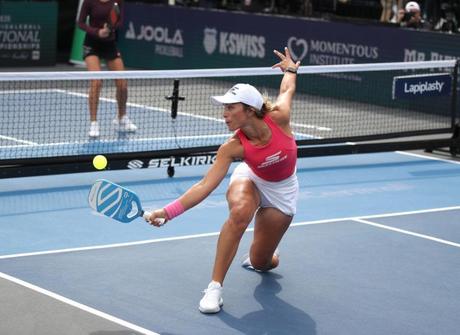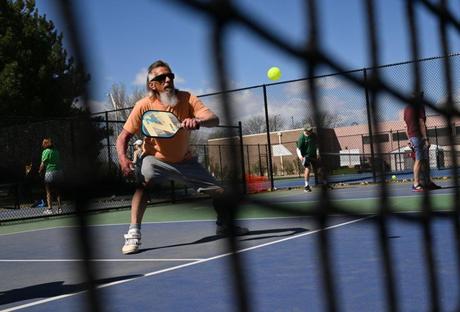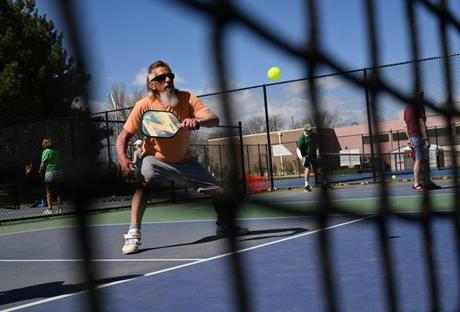
-
The pickleball craze has led to tens of thousands of courts opening across the US.
The noise leads to complaints, lawsuits and even hunger strikes from local residents.
The industry is trying to find solutions to noise pollution.
"Plink! Plink! Plink!"
At first, the sound of pickleball seems fairly harmless. But as the sport grows in popularity, supported by the tech elites and one-percenters, it has left behind a slew of noise complaints.
Local residents have called the police and filed lawsuits. Some municipalities and park officials have banned the sport locally.
One couple in British Columbia even went on a hunger strike, claiming they were experiencing insomnia, auditory hallucinations and heart palpitations since the pickleball games in their neighborhood intensified, according to the Washington Post.
Now scientists are investigating everything from acoustic substances to the space between orbits in an attempt to come up with a solution.
Why is pickleball noise so annoying?
Pickleball had 8.9 million players in the US in 2022, a three-year growth of 158.6%, according to a report from the Sports & Fitness Industry Association (SFIA).
The US has more than 50,000 courts, but the SFIA estimates that another 25,700 will be needed to meet players' demands.
That means more courts are being built near residential areas - something that has become a source of tension.
People have compared the sound of pickleball to a shooting range, torture and even hell, The New York Times reported. Sue-Ellen Welfonder, a bestselling novelist, told The Times that she turned pickleball-loving characters in her new book into "really annoying people" after the game ruined her visit to her local park.
Pickleball hits are loud - they have been recorded to reach 85 decibels, although games usually peak at around 70 decibels, or about as noisy as a vacuum cleaner or a highway. But that's not loud enough to damage the ears, professor Nicole Laffan told Northeastern Global News.
The story continues
"Real pain" occurs at about 120 to 140 decibels, Laffan said. "Pickleball is nowhere near that."


The annoying nature of the sound probably has more to do with pitch than volume, scientists say.
Kausik Sarkar, a professor at George Washington University, studied pickleball strikes for network WUSA9. He discovered that the plastic ball makes a mid-frequency sound when it hits the paddle. By comparison, a tennis ball makes a pop with a lower frequency.
Mid-frequency sounds are easier for people to pick up, American University audio engineering professor Braxton Boren told WUSA9, so they will "actually sound louder than the same amount of sound pressure at a very low frequency or at a very high frequency."
Another problem is that the soundscape associated with Pickleball is very unpredictable. The sport is played on smaller courts than tennis, allowing players to exchange balls quickly. Sports complexes can also pack more players into their facilities, which means more party cheers.
"Things like pickleball, things that are more impulsive with unpredictable spikes where there will be some noise and then some silence and then some noise that almost keeps grabbing your attention," Boren says, per WUSA9.
The sector is trying to find solutions
One way to solve the problem is careful urban planning, says Bob Unetich, a pickleball enthusiast and professor at Carnegie Mellon University.
The engineer founded Pickleball Sound Mitigation LLC, a company that specializes solely in the sport, according to The Hustle.
For Unetich, courts more than 1,000 feet away shouldn't pose much of a problem for residents. He estimates that only a few hundred courts in the U.S. are below that barrier.
"Cities often do this without any consideration for noise because they haven't thought about it," Unetich told The Hustle.
But as demand for the sport increases, finding spots far enough away may become more difficult, he said.
Sound barriers can reduce game noise by 10 to 15 decibels, but they are expensive, at about $50,000 each, per The Hustle.
Another way to tone down the sport is to change gears.
The sport's national governing body, USA Pickleball, has made "significant investments" over the past fifteen months to find high-tech solutions to pickleball's noise problem.
The organization has worked with acoustic experts to identify acoustic fabrics and panels that can help reduce the noise emitted by the kit.
Last Tuesday it announced the certification of the first product in the newly launched 'quiet category', which aims to reduce the game's acoustic footprint by '50% or less'.
The OWL paddle delivers a lower frequency hit, USA Pickleball said in a press release, peaking at 600 hertz and a decibel level below 80.
"By comparison, industry standard pickleball paddles register 1,100-1,200 hertz and a near-damaging decibel range of 85+ when striking a ball," the statement said.
The organization hopes the "quiet category" could soon include "a wide range of products, including paddles, balls, paddle covers and noise-reducing screens for pickleball courts," the statement said.
USA Pickleball is also compiling a list of acoustic experts trained to help dampen the sound of the game, according to Axios.
Carl Schmits, director of equipment standards and facility development for USA Pickleball, told Axios News that experts were initially "concerned that the technology needed to reduce the acoustic signature [of pickleball] would significantly change the nature of the sport."
Currently, products like the OWL paddle are only approved for recreational use. Whether or not they will be embraced at an elite level will be the ultimate test of their success.
Read the original article on Business Insider
